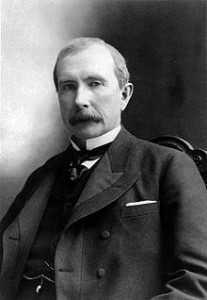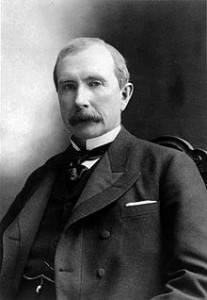 John D. Rockefeller is widely considered to be one of the richest men in history, with an estimated net worth of $663.4 billion in 2007 dollars. His company, Standard Oil, was at the heart of the American petroleum revolution and its industry dominance led to the creation of anti-trust legislation and fair competition laws. There is more information about Rockefeller’s humble beginnings at the end of this article.
John D. Rockefeller is widely considered to be one of the richest men in history, with an estimated net worth of $663.4 billion in 2007 dollars. His company, Standard Oil, was at the heart of the American petroleum revolution and its industry dominance led to the creation of anti-trust legislation and fair competition laws. There is more information about Rockefeller’s humble beginnings at the end of this article.
1. Save Compulsively and Invest
Over the course of three years, Rockefeller saved up a year’s salary as a clerk and at the age of 19 launched his first venture buying and selling produce. Known for his thoroughness, Rockefeller had the unlikely combination of also being a risk-taker, and took out a $20,000 (2010 dollars) loan from his father to start the venture.
He was incredibly conservative with his earnings, marking personal expenses down in an accounting ledger. Eventually, his savings from the produce venture allowed him to transition into the oil refinery business, which paved the way for his future financial success and fame.
“I wore a thin overcoat and thought how comfortable I should be when I could afford a long, thick Ulster. I carried a lunch in my pocket until I was a rich man. I trained myself in the school of self-control and self-denial. It was hard on me, but I would rather be my own tyrant than have someone else tyrannize me.” – John D. Rockefeller
2. Dont Try To “Get Rich Quick”
Contrary to the advice of most “wealth gurus,” Rockefeller’s story underscores the idea that wealth is acquired over a lifetime of hard work and focused intensity.
“You will remember that the business in its early years was a sort of gold-field rush. Great fortunes were made by some of the first adventurers, and everything was carried on in a sort of helter-skelter way.
Rockefeller represented the second, more rational stage of capitalist development, when the colorful daredevils and pioneering speculators gave way to the men who had grown up in the hard school of life, calculating and daring at the same time.
Above all, they were temperate, reliable, shrewd, and completely devoted to their business.” – Titan by Ron Chernow
3. Self-Motivation is Key
It’s easy to be excited in the early days of a new venture. Maybe even for the first few months, you continue to come to work, eager to realize your dreams of building up your company and having an impact in the world.
As the months turn into years, and workplace repetition kicks in, it can be difficult to maintain that same level of passion and drive for your business. However, maintaining this edge is essential for spotting industry-shifting opportunities and for putting in more effort than your competitors.
External motivation is important. Often times this is comprised of numbers. How much money you have in the bank. How many visitors come to your website. How many employees you have.
Still, internal motivation is more important, because external motivation isn’t always there.
Read it in Rockefeller’s own words:
“For years on end I never had a solid night’s sleep, worrying about how it was to come out. I tossed about in bed night after night worrying over the outcome. All the fortune that have made has not served to compensate for the anxiety of that period.” – Source
During this period, Rockefeller gave himself nightly sermons where he motivated himself, maintained control over his emotions, and gathered his strength for another day of hard work.
4. Pick the right marketplace
There’s no doubt that Rockefeller was a shrewd businessman. Likely, he would have risen to the top in a multitude of industries. However, it’s highly unlikely that he would have been worth as much, had he not been at the heart of the petroleum revolution.
Not only did Rockefeller pick the oil industry, but he picked oil refining in particular, as opposed to extraction or transportation. Over time, this allowed him to have an unprecedented amount of control over the marketplace, which led to the creation of new anti-trust legislation to prevent the creation of monopolies.
His choice to enter the oil industry was perfectly suited to his ability to minimize costs and develop management systems. Eventually, Standard Oil dramatically decreased the price of oil and kerosene by making use of economies of scale.
Although his predatory pricing practices and market domination drove countless other entrepreneurs out of business, it led to a great consumer product and made the founder rich. At the time, the oil industry was the best place for Rockefeller to gain this kind of marketplace control.
5. Build A Strong Team
Rockefeller had a knack for attracting great people and quickly assessing partners. He was able to build a strong organization that was passionate about their industry dominance and that was eager to expand.
Many of his generals or head managers thrived in the highly competitive environment and would sometimes go out of there way to encourage unsavory industry practices to help the company get ahead.
In addition, Rockefeller structured his organization in a way that protected him from federal laws. Many of his managers took questionable actions of their own accord. He didn’t allow anyone aside from his top managers to speak with him. The rest of the organization communicated with the top managers.
Although his team may not have helped the company conduct honest business in today’s standards, at the time, the country’s legal system was not as advanced and there wasn’t as much of a crackdown on monopolistic practices.
The way that Rockefeller got his entire team to beat to the same drum and row in the same direction is a testament to the power of a group of people working with focused intensity on a common goal.
Rockefeller’s Rise to Riches
Note: all conversions are in 2010 dollars
Rockefeller’s first recorded earnings came from farm labor where he made $0.375 cents per day ($8.67). He experienced his first non-wage earnings when he loaned a farmer $50 ($1,155.42) at 7% interest and made $3.50 ($80.88) at the end of the year.
The notion that one could make money from money was a big eye-opener for little Rockefeller.
“He was thunderstruck by the happy math [computing the interest he would get at the end of the year], which hit him with the force of a revelation…’The impression was gaining ground with me that it was a good thing to let the money be my slave and not make myself a slave to money.’” – Titan by Ron Chernow
Rockefeller got his first job as a clerk at age 16 for a commission merchants/produce shippers firm. He was paid $200 ($4,621.67) a year initially and shortly after received a raise so that he was paid $300 ($6,932.50) a year.
When he was 19 years old, Rockefeller had saved up $800 (equivalent to a year’s salary at this point in his career) ($19,906.14) and both he and his business partner invested a total of $4,000 ($99,530.70) in a startup company that would buy and sell produce. Since both partners were required to invest $2,000 ($49,765.35) and Rockefeller fell short, he made up the difference through a loan from his father.
The profit from this first venture in his first year was $4,400 ($105,475.70) and the profit after the Civil War when he was 23 was $17,000 ($407,519.74). Around this time, Rockefeller got his first loan outside of his family from a local bank for $2,000 ($49,765.35).
The total capital for his first refining venture at age 24 (his firm pledged half) was $8,000 ($139,995.02). In the next year, he was audacious and borrowed $100,000 to expand the business ($1,749,937.73).
At age 25, he bought out his business partner in the oil refinery business for $72,500 ($998,980.20) and gave up his half interest in the commission business. At this time, the oil refinery was the largest in Cleveland and treated 500 barrels of crude oil daily. It was also one of the largest facilities in the world.
At this point in his career, although Rockefeller is not famous, there is no question that he was rich. In the next four years, he spent most of his time gathering cash from banks and investors and implementing plans to expand his business. He also began his controversial bargaining with the railroad companies. At age 29, he bought a conservative house on “Millionaires’ Row.”
After this rise to power period, Rockefeller spent the remainder of his years building a monopoly of the oil industry and amassing more wealth than anyone thought possible.
